
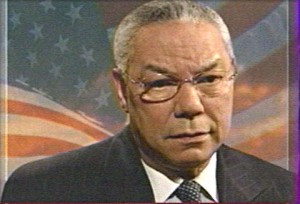 One aspect of the 2008 Election is reminiscent of the Sikh community’s response to the September 11, 2001 terrorist attacks. In the aftermath of that fateful Tuesday morning, Sikhs began declaring that, “we are not Muslims.” Of course, the intention was not to deflect hate or anger towards properly-identified Muslims, but to inform others that Sikhs are members of a separate faith. An implication from the “we are not Muslim” approach, however, was that it was okay to target Muslims. Some Sikhs therefore began asking themselves, ‘what if I was Muslim?’ The answer, of course, is that the discrimination and harassment would still be wrongful. As a result, Sikhs supplemented their statements by not only explaining that they are not Muslims, but openly denouncing hate directed against anyone based on their actual or perceived race or religion.
One aspect of the 2008 Election is reminiscent of the Sikh community’s response to the September 11, 2001 terrorist attacks. In the aftermath of that fateful Tuesday morning, Sikhs began declaring that, “we are not Muslims.” Of course, the intention was not to deflect hate or anger towards properly-identified Muslims, but to inform others that Sikhs are members of a separate faith. An implication from the “we are not Muslim” approach, however, was that it was okay to target Muslims. Some Sikhs therefore began asking themselves, ‘what if I was Muslim?’ The answer, of course, is that the discrimination and harassment would still be wrongful. As a result, Sikhs supplemented their statements by not only explaining that they are not Muslims, but openly denouncing hate directed against anyone based on their actual or perceived race or religion.
In the last few weeks, with Election Day approaching (and political strategies and rhetoric becoming increasingly bold as a result), questions have resurfaced regarding whether Senator Barack Obama is Muslim or Arab. (For example, “When a John McCain supporter at a recent rally said she didn’t trust Obama because he was an Arab, the senator replied: ‘No. He’s a decent family man.'”). The answer, to anyone who has paid attention to the news over the course of the past ten months, is no, Senator Obama is not Muslim or Arab. But the underlying question again is, ‘so what if he was?’
As we decide on the presidential candidate we will vote for this election year, their values, thought-processes, and interactional styles are as important as their policies. I feel regardless of who wins the election, their policies will ultimately change during their presidency. George Bush Senior said he would provide tax-cuts during his presidency and ultimately raised them. Bush Two wanted smaller government, but added the Office of Homeland Security. Bill Clinton promised health-care reform for insuring more Americans, but when he left office “ … there were at least 3 million more people uninsured in the U.S.”. The only stability these candidates can provide us are their values, thought-processes, and interactional styles because, at both of their ages, habits generally don’t change. These habits rooted in personality and experience, will provide insight into what kinds of policy decisions they are more likely to make when policy changes occur during their presidency for various reasons. Each candidate’s current stance on policies during the campaign season and voting record are crucial for providing insight into their values and thought-processes, but they should not be the sole measures for determining who is the better candidate. For example, how they interact at debates is critical because it reveals temperament and interactional style for engaging in “heated” moments we can expect our leader to encounter domestically and internationally, particularly after the state-of-affairs Bush is leaving us with. These debate moments along with those on the campaign trail also show us how these candidates will work “across the table” with red AND blue politicians to get legislation passed. Ultimately, we know there won’t always be a foreign policy advisor or a “cheerleader” to hold either of these candidates’ hands during these “heated” moments when you just have to act, while ensuring you’re doing the best for the American people and upholding American principles and ethics.
So another way of gaining insight into a person’s values, thought-processes, and personality is how they make and spend their money, particularly campaign money. We have heard of the battle of McCain and Obama robo-calls and Obama campaigning through video games, but what’s the overall picture look like … click here and here to decide for yourself!
Let’s us know what you think!
The Presidential election is two weeks away, and before we vote, we should know where the candidates stand on issues, not just whose campaign style we like. Below is a summary of the candidates’ positions on a selection of issues (compiled by the Associated Press). For more detailed information on their positions, check out the McCain and Obama websites.
ABORTION
McCain: Opposes abortion rights. Has voted for abortion restrictions permissible under Roe v. Wade, and now says he would seek to overturn that guarantee of abortion rights. Would not seek constitutional amendment to ban abortion.
Obama: Favors abortion rights.
AFGHANISTAN
McCain: Favors unspecified boost in U.S. forces.
Obama: Would add about 7,000 troops to the U.S. force of 36,000, bringing the reinforcements from Iraq. Has threatened unilateral attack on high-value terrorist targets in Pakistan as they become exposed, “if Pakistan cannot or will not act” against them.
Recently on TLH we have had many posts around the 2008 Presidential Campaign. How these candidate make us feel and their policy positions are equally important when deciding, which candidate to support. The qualities and values he brings to the table for organizing support around what he thinks are critical issues is important for identifying which man will make the best key leader in America. We have listened to them debate, create campaign ads, and talk on campaign trails to their supporters. At the end of the day, I personally want to know how McCain and Obama will stand on issues important to me as a Sikh. The  economy, healthcare, foreign policy, and civil rights are important to all Americans regardless of ethnic or religious background; however, the nuances of how each ethnic/religious community is effected by these larger issues is important when their members vote for a Presidential Candidate. Many Sikhs may want to know:
economy, healthcare, foreign policy, and civil rights are important to all Americans regardless of ethnic or religious background; however, the nuances of how each ethnic/religious community is effected by these larger issues is important when their members vote for a Presidential Candidate. Many Sikhs may want to know:
“What is John McCain’s stance on racial profiling? How would an Obama administration address workplace religious discrimination?”
In an effort to answer some of these questions, the Sikh Coalition sent questionnaires to both McCain and Obama campaign offices many months ago. The intention was to have this information available when organizing Sikhs to vote at local Gurdwaras. However, only the Obama campaign responded. In an effort to provide bi-partisan information to the Sikh constituency, the Sikh Coalition is now petitioning McCain to respond, particularly when there are less than 30-days left until election-day. Sikhs deserve to hear his voice when making their decision at the ballot box. In addition, as a non-profit organization, the Sikh Coalition can not solely release Obama’s responses.

“I don’t trust Obama. I have read about him and he’s an Arab.”
So said a McCain supporter at a recent rally. To such an ignorant, bigoted, racist comment, McCain could only reply:
“No, ma’am,” he said. “He’s a decent, family man, a citizen that I just happen to have disagreements with.”
McCain did not say that Arabs are decent people, instead we are left to infer that “Arabs” and “decent, family man” are somehow antonyms. Barack Obama should not be let off the hook either as he is just as complicit. Earlier when his Democrat primary opponents were trying to smear him, he distanced himself from being Arab and Muslim (which of course he is not!), but did not stop that conversation and say Arabs and Muslims are just as American as anyone else.
In keeping with the recent Election 2008 theme on TLH, I ask you the following — which party do you think completes this sentence:
[x] believe that individuals should contribute time and resources to serving the poor, vulnerable, and less fortunate members of our society.
Do you think x refers to:
- Democrats; and/or
- Republicans.
So this past Saturday, Tina Fey, did a great job impersonating Sarah Palin’s “performance” at the Vice Presidential Debate on SNL. The body language, voice, and choice of words were right on and HILARIOUS!
Yesterday, Robin Abcarian, of the Los Angeles Times, wrote about the debate of body languages between Obama and McCain during this week’s Presidential Debate.
Abcarian wrote:
Obama sat like a jazz musician on his chair, one heel hooked at an angle, while McCain sat as if he might leap up at any moment, or stood impatiently waiting for his turn to speak.
Glass, a body language expert said that McCain was, “… like the Energizer Bunny [who] had some batteries put in. “We have never seen McCain so warm and fuzzy and likable and dynamic.”
This same expert thought that, “… Obama seemed unnatural at times. “Somebody coached him and did not do him a favor,” she said. “When he talks about an issue he’s passionate about, his gestures are fluid and real, but other times, he took his index finger and clasped it to his thumb, and it’s phony, it’s not real.”
However, at the end of the debate, body language experts declared Obama as the winner because “… a debate is won in the first 15 minutes and lost in the last two … Obama closed on a higher note than McCain.”
For our readers, who watched the Presidential Debate, what body language or mannerisms did you notice that would be great for another Saturday Night spoof?
From the Volokh Conspiracy:
Dear Senator McCain:
Repeatedly calling me and everyone else in the United States “my friends” is extremely annoying. In part, it’s just an irritating phrase. Beyond that, I’m not your friend. I don’t know you, and, from what I know of you, I don’t even really like you. Sorry to focus on such superficialities when the world economy is going to Hell, but you probably lost more votes with your constant repitition of “my friends” than from anything Obama said.
Sincerely,
David B. [link]
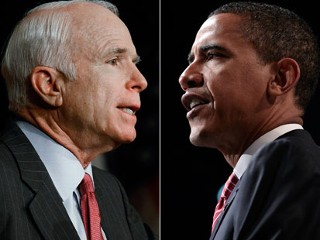 Reema (I’m signing on.)
Reema (I’m signing on.)
Both candidates used the phrase. And of course, because of my bias, it grated on my nerves when McCain used it. It was just amusing when Obama did. Anyone who is about to control my life and the lives of all US residents is not a friend, and they shouldn’t try to be. They just better know what they’re doing because everything (economy, environment- one in 4 mammals is threatened with extinction, social security, Medicare + Medicaid) seems to be falling apart at the same time. Not to be dramatic or anything. The only suggested economic solution from a Sikh point of view I found was vague, overly ambitious, and not really very palatable either.
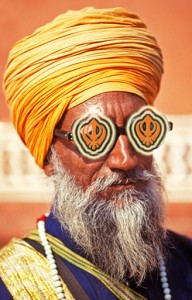 Has anyone else noticed how ridiculous the (US Presidential Election) campaigns have gotten? The ridiculousness has reached a new all time low in the past few weeks with both sides slinging mud, making tenuous connections, and outright lying. Admittedly, I have a preference for one side over the other, but like most people nowadays that means less than it used to and I have truly tried to be “fair” in my analysis of recent politicking. What I have seen from both sides makes me gag.
Has anyone else noticed how ridiculous the (US Presidential Election) campaigns have gotten? The ridiculousness has reached a new all time low in the past few weeks with both sides slinging mud, making tenuous connections, and outright lying. Admittedly, I have a preference for one side over the other, but like most people nowadays that means less than it used to and I have truly tried to be “fair” in my analysis of recent politicking. What I have seen from both sides makes me gag.
It seems to me that the strategies on both sides of the isle amount to this: avoid answering any questions; lie/stretch the truth whenever you feel you can get away with it (or even when you know you can’t), and don’t forget to act arrogant. If you doubt my generalization, I implore you to go to johnmccain.com or barackobama.com and look at the ads for yourself, watch the debates, or just snippets on youtube. What’s even worse is that the media has come to expect this childishness. Some of you may be thinking “So what?! – this is politics.” It is my hope that most of you don’t feel that way and just accept this behavior as the status quo.
I think what gets to me about this whole election cycle is how fundamentally un-Sikh-like the behavior has been. Let me explain. As a Sikh – I like to look at things through my Sikh glasses and when something is fuzzy or just doesn’t make sense, it is time to analyze why. Growing up as a Sikh and trying to live a gursikh life now, I have come to think of certain things – stand up for what you believe in, speak the truth – as almost requirements for being a good person. Gurbani provides numerous references to such virtues and while I am sure they are no different from many other religions, I think they are much more pronounced in the Sikh faith. Integrity, honesty, and courage are central to Sikhi. So from this perspective I evaluate recent campaign tactics.
Ultimately, my point is that the campaigns aren’t making their cases very well to someone like me, who is wearing gold rimmed, khanda shaped, Sikh glasses. Ideally, I’d like a President who I can feel good about, someone I see as a role model, and right now the choices leave much to be desired…
—
By the way, despite the above I feel one of the candidates is at least trying to steer clear of the muck and focus on the issues…so I give props to OBAMA for that. Go OBAMA!
Last week Bill Maher was a guest on the Daily Show, promoting his new movie Religulous and offering a clip. The clip happened to show a sardar in a London park, which was the extent of any Sikh’s appearance in the movie.
The name, ‘Religulous,’ is a portmanteau blending the words 1) religion and 2) ridiculous, and examines the overlap of those concepts. The movie’s proclaimed purpose is to promote doubt in the minds of those who have blocked doubt in religious teachings completely and subsequently hold totally irrational beliefs (i.e. reject evolution), though those who actually go to watch the movie probably wouldn’t be completely opposed to such doubt to be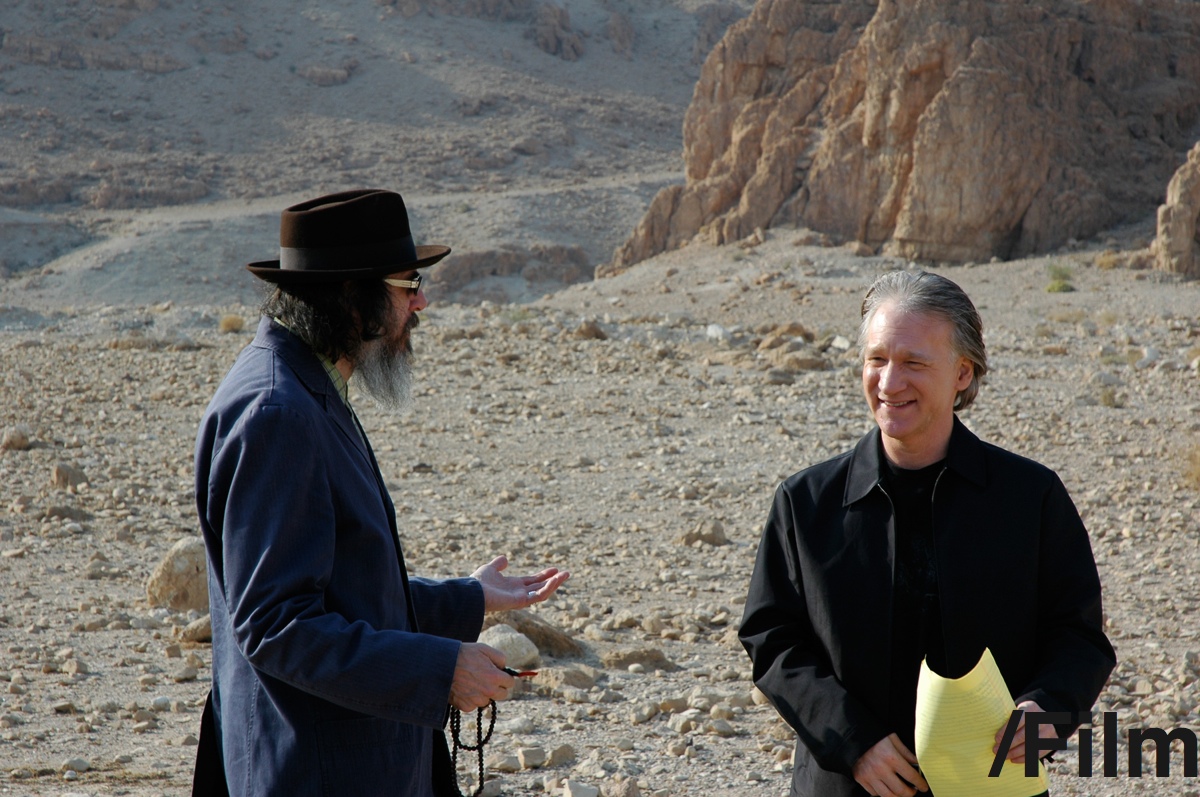 gin with. Of course at some point the explanations of rationality end, and there is the unknown. The point of the movie is to admit that it actually is unknown, and show that those who claim to know, really don’t.
gin with. Of course at some point the explanations of rationality end, and there is the unknown. The point of the movie is to admit that it actually is unknown, and show that those who claim to know, really don’t.
In the movie, Bill Maher interviews people from a variety of backgrounds and religious faiths (from a former head of the Human Genome Project and the former Director of the Vatican observatory to a British rapper). Some hold more nuanced views than others. He listens and asks questions of people who staunchly believe in literal translations of age old texts even when their beliefs scientifically absurd, and has some interesting (and comical) conversations. My favorite interview by far was with a very rational Vatican priest who happily admitted that Jesus’ birthday is not on December 25th and the Catholic church has absolutely no idea when it really is.
Often on this blog we have discussed what role our institutions should play in our lives and recently I had an opportunity to examine the issue anew. In a recent gurdwara council meeting I attended, one gurdwara decided to give a large sum of money to a group putting on a bhangra program. The group was not affiliated with the gurdwara. I will admit, I did not say anything at the time because I do not attend the gurdwara that decided to do this, but the incident did get me thinking about gurdwara funds and the concept of daswand.
When a gurdwara collects funds from the sangat – it does so under the pretence that the money is being collected to be put to some higher use, a use that we ourselves could perhaps not put it to, whether it be spiritual or practical. Usually we give the money as part of our daswand or some random seva to the gurdwara, but I think in every case it is understood that we are giving the money up to be put to a use that our Guru’s would have used it for – something necessary, something practical, and fundamentally “good.”
And as I write this post, some questions that I haven’t even answered for myself come to mind – Is the daswand I give to the gurdwara something I have a right to control – can I decide where it goes? If Sikhi is to be treated like a democracy, I would argue that absolutely I have every right to “vote” on where the funds go or at least have a chance to say something. But even in such a vote – should there be limits? Shouldn’t the funds of a gurdwara be spent on activities, which embody Sikh ideals and values? Presently, I am inclined to believe that sangat should have a say in where gurdwara funds are spent, but also that the options for spending funds should be limited to projects that actually embody and promote Sikh ideals.
But back to where we started – I brought bhangra up because it is something that can be debated – I’m not contending that it is an anti-Sikh activity, but at the same time, I don’t really think bhangra is something that perpetuates the Sikh way of life either. So I guess the dilemma in my mind in determining where the gurdwara should be spending its funds and where to draw the line…
In an effort to better understand the food habitats of Panjabi immigrants, Canadian researchers conducted a three-year study on the ingredients used in daily Panjabi meals and food choices made by Panjabi families.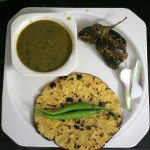
Gwen Chapman, study leader and British Columbia University nutrition professor, stated:
“Since cardiovascular diseases and type II diabetes are more prevalent among Indians and they are linked to food habits, we wanted to understand what ingredients went into daily Punjabi or Indian meals.”
An important part of study was also understanding how cultural affiliations play a role in Panjabi immigrant food choices.
Researchers found that “in Punjabi families in British Columbia … separate meals are often prepared to accommodate elders who need traditional roti, daal and subji, and younger family members who prefer to balance Indian and “Canadian” foods.”
While reading this article I thought about how these food choices actually play out in immigrant Panjabi homes across North America. I remember the rotis without butter for those who have high cholesterol and the weekend meal of burger and fries for us “American” kids. There were also the interesting “masalaa” pastas, lasagnas, and pizzas that had a “Panjabi” twist (i.e. tons of garam-masalaa). I recall uncles’ refusing to eat “kaa-foos” prepared by their wives, aunties making tofu-sabiji, and mothers’ substituting olive oil for vegetable oil when making tarkas. Many of these food choices were an effort to provide more healthy meals as a “preventive” form of action against heart disease and diabetes; while others were made to satisfy taste-buds.
So I was wondering what interesting food choices have you seen Panjabi families make in the Diaspora both to satisfy taste-buds and become more healthy?
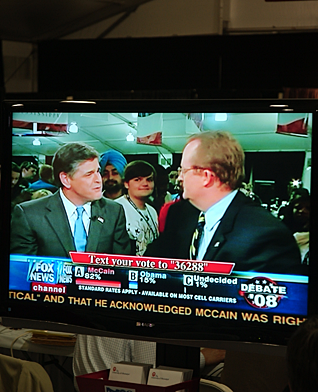 Were you watching the Presidential debate last Friday? Did you catch flashes of a sardar in a blue turban? I assume that anyone who did was equally as surprised as I was (though happily so). Well, who is the mystery man? He’s Arvinder Singh Kang, a twenty five year old who was the only Punjabi, and the only Sikh at the University of Mississipi when he came from Punjab to do a graduate degree.
Were you watching the Presidential debate last Friday? Did you catch flashes of a sardar in a blue turban? I assume that anyone who did was equally as surprised as I was (though happily so). Well, who is the mystery man? He’s Arvinder Singh Kang, a twenty five year old who was the only Punjabi, and the only Sikh at the University of Mississipi when he came from Punjab to do a graduate degree.
I came to the U.S. in the fall of 2005, as a graduate student at the University of Mississippi. From a proud Sikh family, I was the first kid from my village and from my maternal and paternal lineage to come to America for studies.
I brought twenty-something Puggs (turbans). I knew Japji Sahib by heart and had been exposed to Sikh history more than I had been to comics. All through my undergrad years, I had taught my juniors how to wear a turban. There was no doubt, whatever the circumstances might be, I would always be a Turbanator!
While boarding a plane from London’s Gatwick Airport, I sat beside a Sikh girl living in Houston who was born and raised in London. “…So it’s going to be hard to keep a turban in university”, she said in a lovely British accent.
“Much nee te kuch nee!” (What’s a man without a mustache) I had quipped. [link]
You can read more from Arvinder at Sikhchic.
Though this may not be the best analogy, I’m going to make it. It seems the Congress party in Haryana made the demand for a separate Gurdwara committee, in order to mobilize Sikh votes in their favor (at least according to one news source).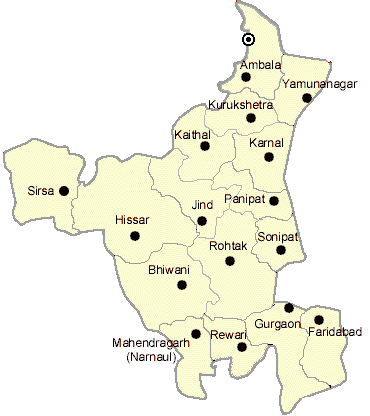
What is also well known is that Haryana’s Sikh vote has traditionally been mobilised by the SAD(B) for Devi Lal and then his son Om Prakash Chautala’s party. After 1984, the anti-Congress vote headed in that direction even more. By all accounts, the 2005 Assembly elections — also the one in which the Congress manifesto included the demand for a separate gurdwara management body for Haryana — constituted a break in the story. According to a CSDS survey, 50 per cent of the Sikh vote in Haryana went to the Congress in 2004, and only 35 per cent to Chautala’s INLD. [link]
And Sarah Palin- as qualified as she may be- was not selected to run as Vice President because of her outstanding qualifications, but for her token status as a woman. It was hoped that she would fulfill the dreams of Hillary supporters who wanted the glass ceiling in the White House shattered. (From what I’ve seen in the polls though, this doesn’t seem to have worked. The women who rallied behind Hillary don’t want a token representative.)
In the aftermath of the September 11, 2001 terrorist attacks, Muslims and Arabs in America engaged in various efforts to respond to the post-9/11 backlash.  For example, in the halls of Congress they advocated against discriminatory security measures and in the courts of law they pressed allegations of employment discrimination and airport profiling.
For example, in the halls of Congress they advocated against discriminatory security measures and in the courts of law they pressed allegations of employment discrimination and airport profiling.
Muslim- and Arab-Americans also turned to another, perhaps less conventional forum: stand-up comedy clubs. For example, a comedy show, “Allah Made Me Funny,” was “an attempt by a group of American Muslim comics to counter the negative stereotypes and attitudes about Muslims and Arabs by poking fun at themselves, their communities and the prejudices they face.” [Link; see also here, here, and here.]
The latest edition of Newsweek contains an article by one Sikh, Narinder Singh, regarding his attempts to use comedy for the same purpose.
Heads-up friends, the season of the “Spinning Wheel Festival” is about to begin across North America this autumn. Celebrating Sikh films and art, the first stop will be in New York City on Saturday, October 04, 2008 at the Asia Society & Museum (p.s. that’s next Saturday). Buy your tickets NOW! The wonderful Rabbi Shergill will be performing at the opening gala (yes I am really biased here … I heart Rabbi Shergill) and DJ Rekha will be literally “spinning” at the after party.
Films a the NYC festival will range from documentaries on Pahelwani (i.e. Panjabi wrestling) and Kaba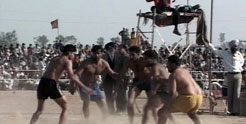 ddi-playing Canadian police officers to issues affecting the Sikh community from 1984 and post-9/11 hate crimes. There will also be short and feature films. For example, one on a young boy’
ddi-playing Canadian police officers to issues affecting the Sikh community from 1984 and post-9/11 hate crimes. There will also be short and feature films. For example, one on a young boy’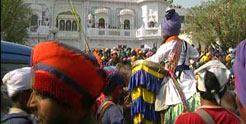 s struggle to keep his hair while his family fears the obstacles he will encounter and another on “… a young Sikh doctor struggling with the inequities of the American Health System and ultimately his own identity”. The Holy Duels of Hola Mohalla is a film looking at the Khalsa Panth.
s struggle to keep his hair while his family fears the obstacles he will encounter and another on “… a young Sikh doctor struggling with the inequities of the American Health System and ultimately his own identity”. The Holy Duels of Hola Mohalla is a film looking at the Khalsa Panth.
The films seem interesting both in content and presentation. The stories are grounded in the realities many of us encounter everyday. You can get a full listing of the films and their synopses here.
In the past, I have attended the “Spinning Wheel Festival” at one of its many North American stops and found it a great space for artists and art-enthusiasts to be exposed to Sikh creativity. I remember there being a panel discussion with the directors and the audience. We don’t have too many of these creative opportunities in our community even though we spend plenty of time and space advertising foreign medical schools in Poland, China, and the Caribbean.
I have found that some films are really hit or miss at these festivals, but it’s expected sense the focus is on cultivating and inspiring creativity; while, building a permanent Sikh film festival for years to come. Cash prizes are awarded to the “bests” in various categories. I have been told that the listing and quality of films varies across the different North American stops.
At the end of the day why not go, especially if it’s close by. I personally think it’s worth a visit as an act of supporting Sikh arts and learning about the various issues affecting our community. Sometimes we get too caught up in our own worlds and don’t realize these issues are taking place or we are in amidst of them and they become normal parts of our lives leaving very little room for reflection or exposure to others’ perceptions. Thus, it’s an 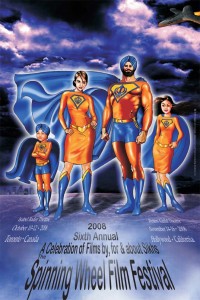 opportunity to get a fresh/new look at various issues.
opportunity to get a fresh/new look at various issues.
Lastly, the arts, from painting and photography to films and music, are our community’s soul! They help us speak in ways we can’t always articulate. So go save your soul and attend a Sikh artistic event! 
Okay, enough of the attempt at convincing … the other North American stops will be:
- Toronto, Canada from October 10-12, 2008 at the Isabel Bader Theatre.
- Hollywood, California from November 14-16, 2008 at the Writers Guild Theatre.
Are ya’ll thinking of going? What have your experiences been at the various Spinning Wheel Festivals? Does anyone know of other North American stops?
p.p.s. The Toronto and Hollywood poster is really interesting isn’t it … a conversation in of itself!
So recently I came across a blog about all the “Stuff Korean Moms Like”. A Korean girl, Chiyo, who loves her KM (Korean Mom) decided to create this blog “to share the joy and dread of KM”. As I went through the list … I kept thinking about our own PSM’s (Panjabi Sikh Moms) … now now don’t think it’s funny to call our mummies’ PMS that actually stands for Panjabi Male Syndrome!
As I went through the list … I kept thinking about our own PSM’s (Panjabi Sikh Moms) … now now don’t think it’s funny to call our mummies’ PMS that actually stands for Panjabi Male Syndrome!
From corningware to marrying people off and stank eye … I found many similarities between KMs and PSMs (although the differences were stark … I don’t even think many PSMs know what redbean is let alone love it. And when it comes to Jesus … let’s just stick with the Gurus and Waheguruji)!
Inspired by Chiyo’s blog on Korean Moms, let’ start our own list of “Stuff Panjabi Sikh Moms’ Like”! I will begin …
- Tupperware (i.e. I am not just talkin’ about Rubbermaid … I mean sour cream and whipped butter dabhaa). Over time this Tupperware becomes yellow from all the haldhee in sabjis … but soak it in the sun and most of the stains go away. Slowly over time old ones are replaced as new ones are collected.
- Corningware (do I really need say anything more … I think Chiyo’s explanation resonates perfectly with PSMs).
- Zee TV, Sony TV, and Alpha Etc. Punjabi nateekhs (what’s your mom’s favorite soap opera …).
- Noon Dhani (i.e. the steel container with small steel bowls and spoons for all their spices).
- Dhahee (i.e. homemade yogurt … sorry I personally can’t stand the boxed stuff after growing up on my mom’s delicious freshly made dhahee).
- Outrage at the rising cost of Ataa (i.e. flour that is commonly bought at the Indian store to make roti).
- House-walls that are painted hospital white … look how clean and simple they look. The rooms feel much more lighted with this color.
- Overstuffing Family And Friends With Food … lai if they leave your house without a food-coma, they did not have a good-time.
- Cooking your favorite Panjabi dish when you come home from college. It’s a sign of how much she missed you.
- The ten Gurus’ pictures, particularly those of Guru Nanak Dev Ji and Guru Gobind Singh Ji, are the number one home-decorating items.
Please add to the list ( it’s in no particular order)! What do you think Panjabi Sikh Mom’s really like? I know many of you must have your own favorites! 
Disclaimer: Please keep it clean, respectful, and hate-free … I really should not have to say this, but unfortunately in the virtual world people often display a “holds-no-bar” attitude when commenting on issues like this one.
Update: wow, I did an AWFUL job of summarizing SRI’s first webinar. (Apologies to the good folks at SRI) Here’s a better summary:
Sikh Theology – A Gurmat Framework: The first session comprised of introducing an approach to Sikhi and recognizing how Guru Nanak Sahib revolutionarily delivered a message of Oneness through illustrating a direct connection between ideas and practice. We engaged in understanding what ‘Guru’ means in the Sikh context and how we can begin to comprehend the Guru’s wisdom, Gurmat. To develop this understanding, three facets of bani (scripture), tavarikh (history) and rahit (lifestyle) were introduced. The greatness of a religion is when harmonious balance between Ultimate reality and visible form is exemplified thru the aforesaid facets. We concluded with Puran Singh’s rendering on the Guru’s vision, “It sweetens you and your sweetness sweetens all life around. At your sight, the lamb and the tiger must drink at the same pool.”
And some info on session 2:
Bani – The Message: In session two, we continued to build on our understanding of the Guru’s message; We engaged in actively learning about the scriptural canon, the Guru Granth Sahib. In covering topics as the compilation, contributors, structure, language and content of Guru Granth Sahib, we tackled questions such as, “How do we know Guru Granth Sahib is the Guru?” and “What is the Sabad Guru?”; thus, facilitating and inspiring us to continue to build our personal relationship with Guru Granth Sahib.
And 3:
Tavarikh – The Revolution: Having concentrated on the written form of our Guru’s message (Bani) last week, this week in session three, “Tavarikh – The Revolution”, we will turn our focus on to how our Gurus exemplified The Message. We will walk through the lives of Guru Nanak Sahib through Guru Gobind Singh Sahib and try to understand them through a social, political, economic and spiritual framework. We will cover a range of issues, from touching on the ramifications of negating the need of a Divine intermediary, to the economic center created by the Guru Sahibs, to the activism of both social and political kind. In surveying the inspiring history of our Gurus, we hope to remind ourselves of how relevant, active and exemplary the revolution of Sikh? is.
In the past, several posts have focused on the work of the Sikh Coalition around community mobilization to fight school bullying and the launch of an educational tool. 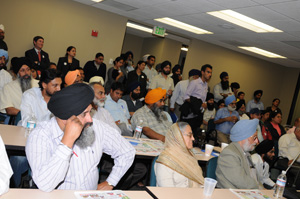 As part of the Sikh Coalition’s on-going work, it has opened a new office in Northern California to provide coast–to-coast civil/human rights advocacy for Sikhs. On September 10th, over 100 attendees, including local community members and politicians, celebrated the Sikh Coalition’s office opening in Fremont, California.
As part of the Sikh Coalition’s on-going work, it has opened a new office in Northern California to provide coast–to-coast civil/human rights advocacy for Sikhs. On September 10th, over 100 attendees, including local community members and politicians, celebrated the Sikh Coalition’s office opening in Fremont, California.
The Coalition’s, Western Regional Director, Neha Singh, said:
“Fremont is nationally the heart of the Sikh community … since we started, we’ve always taken cases from around the country, and a large amount of them were from the Bay Area. We thought it was now time to open an office in an area where a lot of the people requesting our services were.”
Public intellectual Patwant Singh observed that Sikh immigrants have “not only prospered in business, industry, and the professions; they are also beginning to participate in the political life” of their adopted homelands.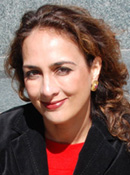 Case in point — Harmeet Kaur Dhillon is currently seeking a seat in the California State Assembly (from the 13th district no less, which covers several prominent San Francisco neighborhoods).
Case in point — Harmeet Kaur Dhillon is currently seeking a seat in the California State Assembly (from the 13th district no less, which covers several prominent San Francisco neighborhoods).
Harmeet’s web site indicates that she has exceptional academic credentials, extensive experience as an attorney, and has been at the forefront of important social issues, especially and including domestic violence in the South Asian community.
Of course, I mention Harmeet’s candidacy here not because of her C.V. or platform, but, let’s face it, because she’s a Sikh. That said, while having more Sikhs in elected public office is important, it does not follow that a Sikh should be supported simply because he or she is Sikh.
